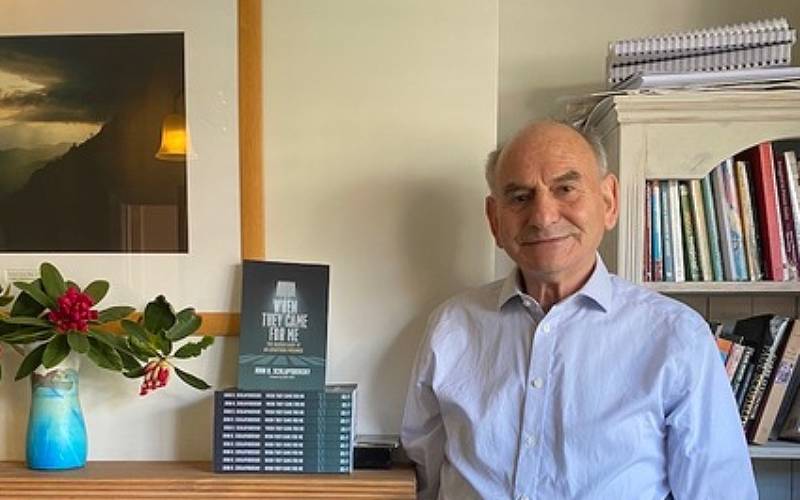“They forced me into this tiny little interrogation room off the big anteroom, a whole mob of policemen shouting and screaming. I thought I would perish there, that I was going to die there and then, which was exactly what they wanted me to think. Their intention was to overwhelm me with terror, and they did. But then Swanepoel’s interrogation partner, a man named Harvey Richter, produced this brick and he held it up in front of me right across my eyes and I thought, looking at its granular surface, that it would abrade my face when he hit me with it. But he didn’t, he put it down in front of me and said: Stand on it.“

John Schlapobersky, BA MSc
London
Episode Description:
John begins our journey through his past by describing his family life before his arrest and torture at the age of 21 at the hands of the South African Security Police. We learn of his family’s longstanding history of opposition to political injustice. He then recounts his methods of survival during his imprisonment which included forming a ‘relationship’ with the brick he was forced to stand on for days and nights. He also internally relied upon his loving parents, his girlfriend, his Jewish identity, and
The Sounds of Silence. He was held in solitary confinement and brutalized until his release to travel to Israel. After establishing his life in England, John eventually began training as a psychotherapist. He describes having life-changing personal treatments including two analyses and he has become a contributor to the field especially to the world of analytic group therapy. He shares with us vignettes of patients he has worked with and how he has turned ‘swords into plowshares’ in his efforts at transforming his own scars into the act of healing others.
Our Guest:
John Schlapobersky, BA MSc is a psychoanalytic and couple psychotherapist and a group analyst accredited by the United Kingdom Council for Psychotherapy. After many years in private practice at the Group Analytic Practice, he established his own Bloomsbury Psychotherapy Practice in 2009. He is also a training analyst and faculty member at the Institute of Group Analysis and an honorary research fellow at the Birkbeck College University of London. He has served as faculty at the London Centre for Psychotherapy, Tavistock Centre for Couple Relationships (TCCR) and is a founding member of the British Society for Couple Psychotherapists and Counsellors. He teaches internationally on topics that include group studies, psychoanalytic and relational theory, and trauma. His commitments include programs in Australia, China, Denmark, Germany, Israel, Japan, Poland, Russia, South Africa, Sweden, Switzerland, the USA, and elsewhere. He was Program Chair for the Group Analytic Society Symposium in 2011: Cultures, Conflict, and Creativity. John was formerly a Consultant Psychotherapist for the Traumatic Stress Clinic, London, and The Medical Foundation for Victims of Torture which, as a founding trustee, he helped establish in 1985. It is now called Freedom From Torture, a leading human rights charity.
Recommended Readings
Bernstein, H. (1994) The Rift: The Exile Experience of South Africans. London: Jonathan Cape. Reissued Persephone Books, Bath UK, 2020.
Pines, M. (1998) Circular Reflections: Selected Papers in Psychoanalysis and Group Analysis. Jessica Kingsley, London.
Rosenthal, N. (2014) The Gift of Adversity. New York: Jeremy P. Tarcher/Penguin.
Sachs, Albie. (1969) The Jail Diary of Albie Sachs. London: Sphere. Reissued Africa Book Centre, London, 1978.
Sachs, Albie (1990) The Soft Vengeance of a Freedom Fighter. Oakland: University of California Press. Reissued Souvenir Press, 2014.
Schlapobersky, J. (2016) From The Couch To The Circle: Group-Analytic Psychotherapy In Practice. Routledge, London.
Schlapobersky, John R.(2021) When They Came For Me: The Hidden Diary Of An Apartheid Prisoner. Berghan Books, Oxford and New York.

It’s been almost two years since I have listened to this episode, and it follows me wherever I go.
I think of the capacity to listen to the song of the condemned and find hope and consolation in it, of the human ability to spin the grains of sand in the mouth of the dead into a golden garment.
I carry the words about remembering and focusing at all times on placing guilt and shame where they belong as both a survival mechanism and the road to salvation.
Thank you both for an incredible conversation.
Thank you. This is profoundly moving and a reminder of so many things – the inhumanity of ‘man’ to ‘man’, the power of music – perhaps especially the human voice, triumph over adversity, depth of human suffering yet resilience and survival, the power of thought and the internal world, and on and on and on. It strikes me that the most powerful weapon against such regimes and experiences is the surviving and enduring wish and resolve to ‘reach out’ despite everything. And the will and the ability to talk about difference and share and embrace it. I will recall this episode for a long time to come. In fact I hope those of us who’ve been moved by it, never forget it. Beethoven – what apt accompaniment. Again, thank you.
This is one of the most profound interviews I have ever listened to.
Dear Susan,
Thank you your touching comment
The act of ‘going public’ with the publication of this story and the exposure associated with it through interviews of the kind you’ve now listened to, has been more unsettling than I might have expected. A comment of the kind you’ve lodged here is deeply reassuring and I thank you for your words.
Sincerely,
John Schlapobersky
John.romm@btinternet.com